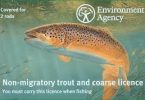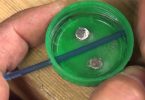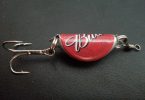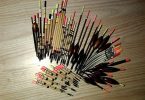By Geoff Patrick
As summer fades into distant memory and our countryside takes on its autumnal cloak of rustic colours with the first hard frosts laying a carpet of morning crispness across that meadow, which a short time ago smelt of the perfume of summer flowers and the drone of summer insect life, now is the time to reflect on the period ahead.
I make no apology for adding this advice each season. If one person is lost, young or old, that is one too many but the advice is as vital to other country activities such as dog walkers, hikers and mountain bike and horse riders to mention just a few.
The water temperature in the local rivers, lakes and the sea plummets during the autumn and winter periods. So please ensure that your safety overrides everything, including landing that big fish. Cut the fish loose rather than risk your life trying to land it.
Local flooding causes undermined river banks which can cave in when you tread on them. Silt thrown up on the bankside following flooding is as slippery as the ice which may cover it both treacherous underfoot. Whilst doing a regular safety check on the local River Arun last New Year’s Day, I ended up in the ice cold waters of that river due to the bank breaking under my feet causing a landslide of silt and mud! Only my automatically inflating life vest and instant assistance from my safety man Mark Emery Webmaster of the Pulborough Angling Society, saved my life. I would not have got out unaided before hypothermia had set in.
Take no risks, as survival in water of mid-winter temperatures will be but a few minutes, before severe exposure and hypothermia sets in. The pure natural environment that we fish in is often very isolated from real world, therefore medical help will take a long time to arrive and after immersion in water of low temperatures, you will soon be in real danger. Keep an item of dry-warm clothing on the bank or in the car. A warm blanket works well, get help by mobile phone ASAP, and keep the victim out of the wind, if possible. Cuddle your fishing buddy, even if he smells like hell, looks horrible, and is shy, it could save his or your life while waiting for medical help. This is a vital step, don’t think twice about doing it, just do it!
A Paramedic crew/Rescue Helicopter/Lifeboat/or Doctor would much rather be called out only to find out they are not required, than not to be called at all and find out later they should have been. Never fish alone in the winter. Always carry that mobile phone leaving it switched on and unlocked in a dry location bank side. Never drink alcohol during a winter fishing trip, contrary to what is often thought alcohol will chill your body and not warm it. It may well kill you if given after submersion or even a normal injury has occurred as it will delay the introduction of painkilling or life saving drugs by medics.
A Chilling Thought: If you are faced with having to resuscitate a victim of submersive hypothermia (who has been under water for some time), who has stopped breathing, no matter how long that person may have been under the water, always clear their airway and start mouth to mouth resuscitation and cardiac massage. DO NOT GIVE UP no matter how long it takes for medical help to arrive. Victims have been revived after spending considerable amounts of time under icy waters. A complex subject, but suffice to say unless resuscitation is given from the moment that person is found and removed from the water, and continued until a senior professional medically trained person says otherwise, the victim will stand no hope of having life restored. It often takes hours warming the body and its vital blood up after the incident before change can be seen. After the medics take over, they have a complex medical protocol to follow if the victim is to stand a chance of life! Without your resuscitation attempts, the medics stand little or no chance of a successful outcome. The first person to meet the victim is the most important; it literally is ‘Down To You’! Ensure when you hand over to professional help that you pass on all relevant information i.e.: How long the person was under water? How long you have been resuscitating the victim? Known illnesses or medications of the victim? Their name and address and yours.
Training courses are available locally from St Johns Ambulance/The Red Cross/the full time professional Ambulance Service and other professional bodies.
My qualifications for writing such an article are as follows. Twenty years as a front-line Leading Ambulance Technician with Paramedic skills within the West Sussex Ambulance Service (now Sussex Ambulance Service) dealing with all the 999 service can throw at you, and years as a member of the Auxiliary arm of H.M.Coastguard Service stationed at Littlehampton West Sussex. During this period of time I have removed many bodies from both fresh and sea water, during late autumn and winter periods. These victims have been from seven years of age to over seventy, most could swim, cold water is a killer.
Let us ensure that angling and other waterside pursuits are enjoyed with safety as the key issue. Protocols for resuscitation may well have changed since my retirement, but the information above is as valuable now as it was then.
Everyone lives in isolated bliss in the belief it will never happen to them. The sad truth is it does! It can happen to absolutely anyone and being a good swimmer is no guarantee of survival. I know this all to well personally, as at the age of eight-years-old I lost a close relative to the River Arun as he reached over a bridge in the flooded river to rescue his Mothers glove, we found him two-weeks later! What price was his life? A glove! Food for thought!
Further thought evoking facts are the difference between normal body temperature and the onset of hypothermia is just 2 degrees Celsius! Plunging into ice cold water will reduce these temperatures so quickly you may not even be aware of it!
Normal body temperature is normally 98.4 F/37 Celsius.
Shivering starts at 35-36 Celsius
Confusion and amnesia at 34-35 Celsius
Irregular pulse and rigidity 33 Celsius
Unconsciousness 30 -33 Celsius.
The reality of trying to protect life in text is harsh, the reality of reporting a death in text even harder!
The Winter Safety Checklist:
Never fish alone in winter. Always give an estimated time of arrival home.
Always leave on the bank in a dry place an unlocked and charged mobile phone.
Call for help instantly.
Always carry a blanket or spare warm clothes.
Never, ever, wear waders in winter. Use good sound footwear that can be kicked off in an emergency.
If a person has fallen in use you body heat to keep them warm until help arrives.
Never give or take alcohol during an incident or whilst winter fishing.
Never take risks in landing specimen fish, cut them lose rather than take that risk.
Never fish a flooded river even if you see others doing so.
Watch out for undermined banks or silt covered banks.
Never venture out into the water in a boat without flotation equipment being worn and certainly never stand up in the boat. Carry emergency flares, a radio or form of communication.
If resuscitation is required (the victim is not breathing or has no pulse) never give up until professional help has arrived.
Do not be shy to start resuscitation even if others stand around with hands in pockets. Take control of the situation.
Carry a hypothermia blanket in your tackle box (like kitchen foil and are about the size of a cigarette packet) and wrap the victim in it. Available for a modest amount from your chemist.
A final question for all readers: Do you or do your relatives value your life at more than £70?? If the answer is yes, then go to your nearest tackle shop or boating shop and purchase an automatically inflating life vest before you winter fish. This will inflate on impact with the water and even if you are unconscious, it will turn you over and keep your face out of the water and keep you afloat. Most are also equipped with a high pitch whistle; blow it with all your might if able.
Available also at good tackle shops are fully protective flotation survival suits at modest prices.
Geoff Patrick – 2002








